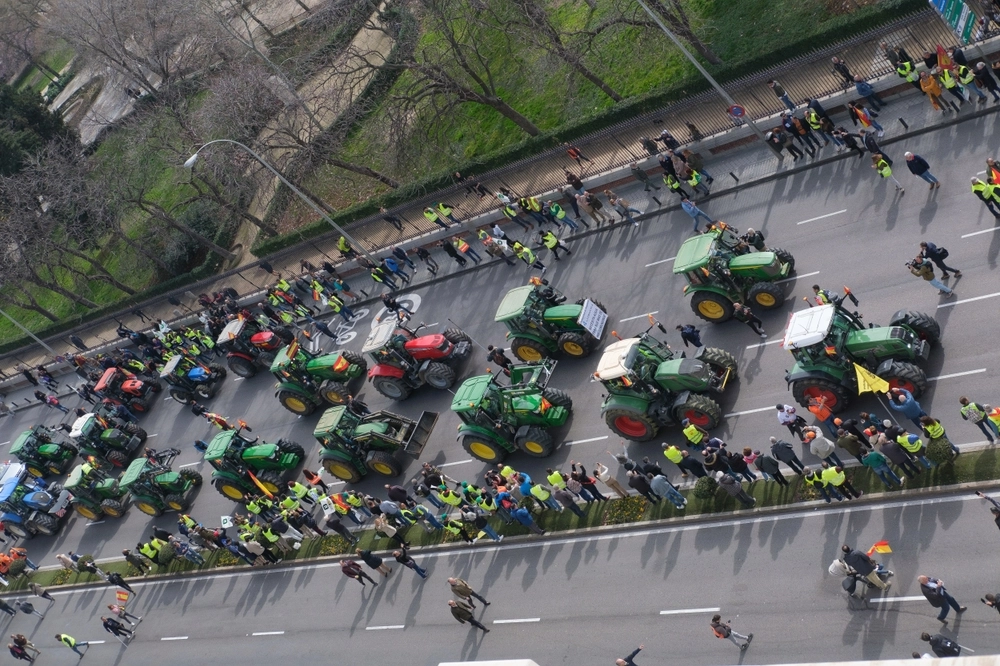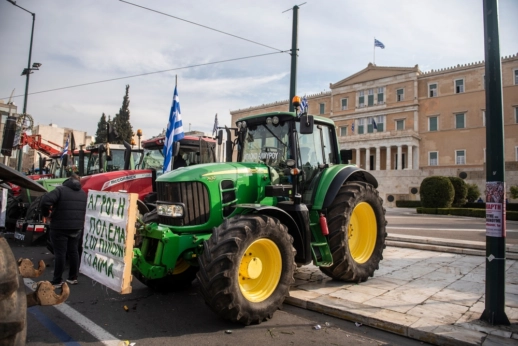As farmer protests continue across Europe, here’s what American producers could learn from the demonstrations.

Dumping manure in public spaces, hurling eggs at government buildings, blocking major roads—the European farmers who have taken to the streets to challenge free trade policies sure know how to raise a ruckus. Beginning with German farmers in January earlier this year, to then include French and Belgian producers, the continent-wide protest movement has expanded into Spain and Italy as of mid-February. Their public disruption has also produced results.
French farmers, for instance, managed to persuade their nation’s leaders to ban food imports treated with the insecticide thiacloprid, dedicate €150 million (US$163 million) annually to support livestock producers and provide European-wide definitions for what constitutes lab-grown meat. German farmers also saw movement in their favor from their lawmakers on fuel subsidies. When protests reached Brussels—where the European Parliament was in session—European Union policy makers announced plans to cushion the blow from Ukraine grain imports and address bureaucratic red tape.
Thus far, the protests offer some takeaways for American food and farm activists.
Specifically, not only can public disruption trigger real change, but there is room to push back against the disastrous free trade policies that have wreaked havoc on farm economies on both sides of the Atlantic. Reducing tariffs and weakening price support policies to align with World Trade Organization (WTO) policy prescriptions, as well as those found in other free trade deals, such as the North American Free Trade Agreement (NAFTA), has made food producers increasingly subject to price volatility. Such regional and international free trade policies took policy-making power away from national governments, transfering that power to unelected bureaucrats who thought food should be treated like any other commodity.
US farmers and their allies should pay attention, think how to make protest part of our ongoing Farm Bill debate and take some power back when it comes to making policy.
In Europe, the Common Agricultural Policy (CAP)—similar to the Farm Bill in the United States—governs most facets of the continent’s agricultural system, including financial assistance, environmental policy and the regulation of exports and imports. Beginning in 1962 with France, Germany, Luxembourg, Belgium, Italy and the Netherlands, the arrangement has grown along with the European Union to cover all of the organization’s 27 member states.
CAP policies began to change in the 1990s to promote “efficiency.” Several policies were eliminated, including export subsidies, production quotas in dairy and price supports that were coupled to farmer income. While US President Ronald Reagan railed against “government cheese” to point out the assumed wasteful nature of US agricultural policy in the 1980s, in Europe, “wine lakes” and “butter mountains” were made into campaign slogans to cut public assistance for farmers.
And cuts took place: From 1980 to 2021, the total EU budget dedicated to agriculture went to below 25 percent from more than 60 percent.
The drop in production is coupled with declining rates of farmers themselves. In France, there were 389,000 farmers in 2020—almost 800,000 fewer than in 1980. Poland has lost 13% of its producers since 2010. Overall, throughout Europe from 2005 to 2020, the continent has seen 37 percent of its farms go out of business. During that same time, production has grown, as only farms of more than 200 hectares (approximately 400 acres) have increased in number.
Matters are much the same in the US. According to the recently released 2022 Census of Agriculture, the largest four percent of US farms (2,000 or more acres) control 61 percent of all farmland. In 1987, that figure was 15 percent. Similarly, in 2015, 51 percent of the value of US farm production came from farms with at least $1 million in sales, compared to 31 percent in 1991. From 1997 to 2022, more than 340,000 farms, or 15 percent of operations, went out of business.

Protesting farmers with their tractors rally in front of the Greek parliament in Athens on Feb. 21, 2024. (Photo: Giannis Papanikos / Shutterstock)
In Europe, the ever-dwindling financial support for farmers is made contingent on meeting various environmental and labor standards. Put simply, for assistance, farmers must do more to receive less. Aiding, not curtailing ongoing consolidation, 20 percent of Europe’s farmers—particularly large-scale operators in terms of land and production—receive 80 percent of all payments.
Adding insult to injury, EU authorities allowed the import of cheap Ukrainian grain to assist that country in its ongoing war with Russia. This, as supply chain disruptions from that conflict drove up the prices that European farmers pay for inputs such as gas and fertilizer. EU policymakers also are negotiating a contentious free trade deal with the South American regional trade bloc, Mercosul, which would invite agricultural export giants Argentina and Brazil to potentially undercut European producers.
US farmers suffer in a similar policy environment as their European counterparts. The 1996 Farm Bill made periodic, ad hoc direct payments the primary way the US government provided financial assistance for producers. Gone, but years later reintroduced in a significantly weakened form, were non-recourse loans that assured farmers a decent income if market prices dipped below a certain threshold. With such loans, decent incomes can be guaranteed without forcing farmers to increase production potentially in environmentally harmful ways as governments purchase products off the market to stock reserves.
To take on the harmful cuts that free trade policy promotion made a reality in the farm policy, US farmers and their allies could find inspiration from what is taking place in Europe, perhaps going to DC to make their voices heard.
In fact, US farmers in the past did so. When free trade was in its infancy back in 1979, thousands of farmers drove their tractors to DC to demand policy changes to address rising foreclosures and increases in input costs. These actions inspired the National Sustainable Agriculture Coalition (NSAC) to bring activists together in DC last year but mainly to make climate policy part of the Farm Bill.
Now, with the Farm Bill debate continuing at least through September of this year, pricing policy reforms could take center stage. Some farm groups, such as the National Family Farm Coalition (NFFC) with its dozens of member organizations, have made pricing policy reform central to their Farm Bill platform. In demanding parity pricing, policy instruments such as non-recourse loans could be improved to assure farmers decent prices and dissuade them from increasing production to make ends meet. Addressing concentration is also part of the NFFC’s demands, with particular attention to an increased role for the government to finance land access programs and enforce antitrust laws.
Do such proposals challenge free trade? Yes, they do. And as European farmers have shown, protest can yield results. By adding some popular mobilization into the mix of our ongoing Farm Bill debate, maybe with the occasional rotten egg or manure load, farmers and their allies could push our lawmakers to make real changes for the benefit of our food and farm system. Let’s not just stand by as the people who grow our food endure yet more financial hardship.
Anthony Pahnke is the vice-president of the Family Farm Defenders and an associate professor of international relations at San Francisco State University; anthonypahnke@sfsu.edu.
Poland stands out at this point in time as condoning shameful actions by farmers. The farmers are blocking grain from Ukraine both by rail and by truck. They then are opening and dumping the grain on the ground from these stopped transports. Ukraine is trying to survive the Russian invasion and need every export they can muster.
This kind of “help” made the British car industry into what it is today. There’s ample evidence that handouts and tariffs only stifle innovation and delay the inevitable. Companies fail into a spiral of incompetent leadership and desperate workers demanding more from a shrinking business. Anyone with ambition and ideas wants to work in an industry that has a future. At least not the kind of future a career in a government dependent industry like Post Office Office or DMV offer. Should we really add agriculture to the list?
Actually, if the policy is effective and pragmatic with reality, its support cannot be argued. However, it goes against the responses that are unavoidable. Your analysis is really good for looking at the problem most objectively.